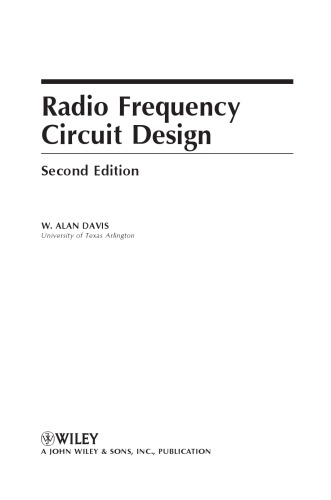

Most ebook files are in PDF format, so you can easily read them using various software such as Foxit Reader or directly on the Google Chrome browser.
Some ebook files are released by publishers in other formats such as .awz, .mobi, .epub, .fb2, etc. You may need to install specific software to read these formats on mobile/PC, such as Calibre.
Please read the tutorial at this link. https://ebooknice.com/page/post?id=faq
We offer FREE conversion to the popular formats you request; however, this may take some time. Therefore, right after payment, please email us, and we will try to provide the service as quickly as possible.
For some exceptional file formats or broken links (if any), please refrain from opening any disputes. Instead, email us first, and we will try to assist within a maximum of 6 hours.
EbookNice Team

Status:
Available4.6
31 reviews
ISBN 10: 0470768029
ISBN 13: 9780470768020
Author: W Alan Davis
A much-needed, up-to-date guide to the rapidly growing area of RF circuit design, this book walks readers through a whole range of new and improved techniques for the analysis and design of receiver and transmitter circuits, illustrating them through examples from modern-day communications systems. The application of MMIC to RF design is also discussed.
1 Information Transfer Technology.
1.1 Introduction.
1.2 Information and Capacity.
1.3 Dependent States.
1.4 Basic Transmitter?Receiver Confi guration.
1.5 Active Device Technology.
Problems.
Reference.
2 Resistors, Capacitors, and Inductors.
2.1 Introduction.
2.2 Resistors.
2.3 Capacitors.
2.4 Inductors.
2.5 Conclusions.
Problems.
References.
3 Impedance Matching.
3.1 Introduction.
3.2 The Q Factor.
3.3 Resonance and Bandwidth.
3.4 Unloaded Q.
3.5 L Circuit Impedance Matching.
3.6 π Transformation Circuit.
3.7 T Transformation Circuit.
3.8 Tapped Capacitor Transformer.
3.9 Parallel Double-Tuned Transformer.
3.10 Conclusions.
Problems.
References.
4 Multiport Circuit Parameters and Transmission Lines.
4.1 Voltage?Current Two-Port Parameters.
4.2 ABCD Parameters.
4.3 Image Impedance.
4.4 Telegrapher's Equations.
4.5 Transmission Line Equation.
4.6 Smith Chart.
4.7 Transmission Line Stub Transformer.
4.8 Commonly Used Transmission Lines.
4.9 Scattering Parameters.
4.10 Indefinite Admittance Matrix.
4.11 Indefinite Scattering Matrix.
4.12 Conclusions.
Problems.
References.
5 Filter Design and Approximation.
5.1 Introduction.
5.2 Ideal and Approximate Filter Types.
5.3 Transfer Function and Basic Filter Concepts.
5.4 Ladder Network Filters.
5.5 Elliptic Filter.
5.6 Matching Between Unequal Resistance Levels.
5.7 Conclusions.
Problems.
References.
6 Transmission Line Transformers.
6.1 Introduction.
6.2 Ideal Transmission Line Transformers.
6.3 Transmission Line Transformer Synthesis.
6.4 Electrically Long Transmission Line Transformers.
6.5 Baluns.
6.6 Dividers and Combiners.
6.7 The 90° Coupler.
Problems.
References.
7 Noise in RF Amplifiers.
7.1 Sources of Noise.
7.2 Thermal Noise.
7.3 Shot Noise.
7.4 Noise Circuit Analysis.
7.5 Amplifier Noise Characterization.
7.6 Noise Measurement.
7.7 Noisy Two-Port Circuits.
7.8 Two-Port Noise Factor Derivation.
7.9 Fukui Noise Model for Transistors.
Problems.
References.
8 Class A Amplifiers.
8.1 Introduction.
8.2 Defi nitions of Gain.
8.3 Transducer Power Gain of a Two-Port Network.
8.4 Power Gain Using S Parameters.
8.5 Simultaneous Match for Maximum Power Gain.
8.6 Stability.
8.7 Class A Power Amplifiers.
8.8 Power Combining of Power Amplifiers.
8.9 Properties of Cascaded Amplifiers.
8.10 Amplifier Design for Optimum Gain and Noise.
8.11 Conclusions.
Problems.
References.
9 RF Power Amplifiers.
9.1 Transistor Configurations.
9.2 Class B Amplifier.
9.3 Class C Amplifier.
9.4 Class C Input Bias Voltage.
9.5 Class D Power Amplifier.
9.6 Class E Power Amplifier.
9.7 Class F Power Amplifier.
9.8 Feed-Forward Amplifiers.
9.9 Conclusions.
Problems.
References.
10 Oscillators and Harmonic Generators.
10.1 Oscillator Fundamentals.
10.2 Feedback Theory.
10.3 Two-Port Oscillators with External Feedback.
10.4 Practical Oscillator Example.
10.5 Minimum Requirements of the Reflection Coefficient.
10.6 Common Gate (Base) Oscillators.
10.7 Stability of an Oscillator.
10.8 Injection-Locked Oscillator.
10.9 Oscillator Phase Noise.
10.10 Harmonic Generators.
Problems.
References.
11 RF Mixers.
11.1 Nonlinear Device Characteristics.
11.2 Figures of Merit for Mixers.
11.3 Single-Ended Mixers.
11.4 Single-Balanced Mixers.
11.5 Double-Balanced Mixers.
11.6 Double-Balanced Transistor Mixers.
11.7 Spurious Response.
11.8 Single-Sideband Noise Factor and Noise Temperature.
11.9 Special Mixer Applications.
11.10 Conclusions.
Problems.
References.
12 Phase-Lock Loops.
12.1 Introduction.
12.2 PLL Design Background.
12.3 PLL Applications.
12.4 PLL Basics.
12.5 Loop Design Principles.
12.6 Linear Analysis of the PLL.
12.7 Locking a Phase-Lock Loop.
12.8 Loop Types.
12.9 Negative Feedback in a PLL.
12.10 PLL Design Equations.
12.11 Phase Detector Types.
12.12 Design Examples.
12.13 Conclusions.
Problems.
References.
radio frequency circuit design book
ham radio circuits pdf
radio circuit design pdf
radio frequency integrated circuits and systems 2nd edition pdf
introduction to radio frequency design wes hayward pdf
Tags: W Alan Davis, Radio, circuit